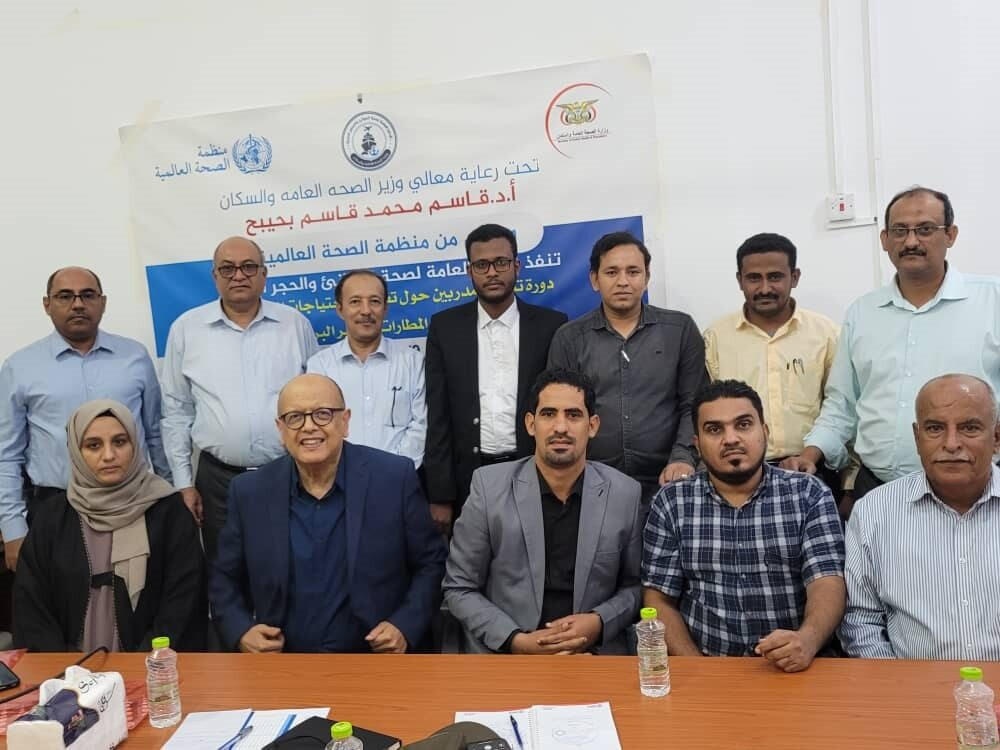 Participants of the point of entry training of trainers workshop in Aden, Yemen. Photo credit: WHO/WHO Yemen21 April 2024 – Yemen faces complex challenges made worse by 10 years of conflict. The deteriorating situation is coupled with a fragile health system, a lack of specialized staff, and a rise in health emergencies, some of which emerge from unexpected sources. Transport, travel and trade are linked to economic development but can also pose public health risks, causing diseases to spread across borders.
Participants of the point of entry training of trainers workshop in Aden, Yemen. Photo credit: WHO/WHO Yemen21 April 2024 – Yemen faces complex challenges made worse by 10 years of conflict. The deteriorating situation is coupled with a fragile health system, a lack of specialized staff, and a rise in health emergencies, some of which emerge from unexpected sources. Transport, travel and trade are linked to economic development but can also pose public health risks, causing diseases to spread across borders.
Points of entry ¬– airports, seaports, ground crossings ¬– pose unique health risks that require specialized capacities distinct from those needed in community and health facility settings. WHO works to enforce the International Health Regulations (IHR) at points of entry and build Yemen’s capacity to prepare for and respond to public health threats from unexpected sources.
Building capacities and pinpointing gaps
In December 2023, the WHO Country Office in Yemen gave a training of trainers workshop on IHR and its core capacities requirements for 14 key personnel from various sectors. These included points of entry staff; health inspectors from multiple airports, seaports and ground crossings; and personnel from national public health authorities.
The training enables participants to conduct national point of entry assessments effectively. The programme used a blended learning approach, combining theoretical sessions with practical field visits, letting participants gain valuable hands-on experience. Moreover, the training ended with a practical tabletop exercise designed to assess and reinforce essential public health functions at points of entry that align with IHR core capacities for prevention, early detection and response.
Standard operating procedures were devised to support the execution of routine activities and the response to international public health emergencies in line with IHR. A national training curriculum, stakeholder analysis, and guidelines on the purpose of IHR for workers at points of entry have also been developed.
 Point of entry assessment and visit to Seiyun Airport, Yemen. Photo credit: WHO, Yemen.The trained team, assisted by national and international experts, conducted national assessments at 10 strategic points of entry: 4 seaports, 3 airports and 3 ground crossings. The findings highlight strong multisectoral commitment and collaboration to fortify health infrastructure and capabilities. Yet they also reveal notable capacity gaps at points of entry premises and in information sharing across various levels.
Point of entry assessment and visit to Seiyun Airport, Yemen. Photo credit: WHO, Yemen.The trained team, assisted by national and international experts, conducted national assessments at 10 strategic points of entry: 4 seaports, 3 airports and 3 ground crossings. The findings highlight strong multisectoral commitment and collaboration to fortify health infrastructure and capabilities. Yet they also reveal notable capacity gaps at points of entry premises and in information sharing across various levels.
The assessments set the baseline for a comprehensive capacity-building plan based on immediate and long-term strategies. Pandemic Fund support will be used to address urgent needs, focusing on prioritized capacities in Yemen. It is vital, however, to sustain financial support and continuous capacity-building to maintain preparedness and response capabilities for public health threats at points of entry.
All hands on deck
Use of the capacity-building plan and the multisectoral assessments brings together stakeholders from human health, animal health, border control and other pivotal sectors. The aim is both to create a holistic understanding of capacities across various sectors, and to align strategies. This fosters a united front to effectively implement and sustain enhanced points of entry capacities that will ensure coordinated and comprehensive preparedness and response to public health threats.
 Multisectoral meeting at Aden Seaport, Yemen. Photo credit: WHO/WHO YemenThis WHO initiative to strengthen IHR core capacities at points of entry is crucial to enhance national, regional and global health security. Through unified efforts, Yemen is positioning itself at the forefront of health preparedness, showing its resilience and determination in the face of considerable challenges.
Multisectoral meeting at Aden Seaport, Yemen. Photo credit: WHO/WHO YemenThis WHO initiative to strengthen IHR core capacities at points of entry is crucial to enhance national, regional and global health security. Through unified efforts, Yemen is positioning itself at the forefront of health preparedness, showing its resilience and determination in the face of considerable challenges.
The success of this initiative hinges on the commitment of all involved parties. Collaboration is critical to prevent cross-border and international spread of disease and promote health security the world over.








